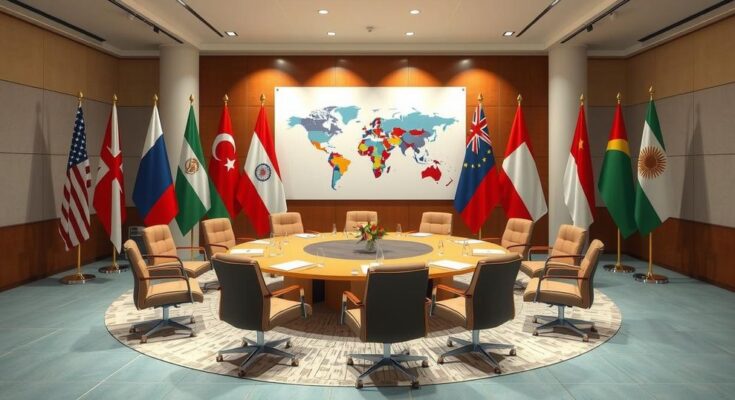The U.S. has initiated new talks with Russia in Saudi Arabia to negotiate a limited ceasefire and explore peace solutions for Ukraine, following positive assessments from Ukrainian officials. Key discussions will focus on halting attacks on energy facilities, with both U.S. and Ukrainian representatives emphasizing the importance of addressing core issues in the negotiations while acknowledging challenges posed by Russia’s position and recent escalations in hostilities.
The United States has initiated new negotiations with Russia in Saudi Arabia, following discussions with Ukrainian representatives aimed at achieving a limited ceasefire. This strategic engagement is part of a broader effort by U.S. negotiators to facilitate peace in Ukraine through what is termed shuttle diplomacy. A report from the “New York Times” indicates that further discussions may involve Ukraine, contingent upon the outcomes of these initial meetings.
Ukrainian officials have expressed optimism regarding the initial talks held in Riyadh, particularly highlighting the constructive nature of the discussions. Ukrainian Defense Minister Rustem Umjerov stated on Facebook, “The talks were constructive and informative – we discussed important issues, especially in the energy sector.” The delegation, authorized by President Volodymyr Zelensky, aims for an “honorable and lasting peace” for Ukraine and Europe.
The negotiations are set to primarily address measures leading to a ceasefire, including a proposed halt to attacks on energy facilities. This initiative was previously tentatively agreed upon during a conversation between President Putin and former President Trump but lacks detailed implementation strategies. Recent conflicts have involved significant drone attacks from both parties.
As explained by Umjerov, the focus of the talks is initially on technical issues relating to energy facilities and critical infrastructure, involving both energy experts and military personnel. Concurrently, there will be discussions with Russia regarding safe shipping initiatives in the Black Sea, tied to the proposed ceasefire.
Ukrainian President Zelensky emphasized the productive nature of the discussions but called upon Russia to cease its military actions, stating, “Whoever caused this war must stop it.” The Ukrainian delegation, led by Umjerov, is accompanied by significant U.S. representation, including special envoy Keith Kellogg and security advisor Mike Waltz, while Russia’s delegation comprises key figures such as Georgi Karassin and Sergei Besseda.
Zelensky has accused Russia of prolonging the war and failing to engage sincerely in ceasefire discussions. Notably, he referenced previous proposals for an unconditional ceasefire that have been disregarded, asserting, “It is Russia that is continuing all this.” He has urged for international pressure on Russia to enforce a cessation of hostilities.
U.S. President Trump, advocating for a swift resolution to the conflict, expressed optimism regarding the prospects of peace. However, Kremlin spokesman Dmitry Peskov has tempered expectations, stating that they are only beginning negotiations. Moscow’s reluctance for an immediate ceasefire was reiterated alongside conditions, including the cessation of Western military support for Ukraine, highlighting the complexities of the current diplomatic landscape.
Recent escalations, such as a deadly drone attack in Kiev that resulted in civilian casualties, have underscored the urgency of these negotiations. As the U.S. and its partners seek pathways to peace, there remains a significant challenge in reconciling divergent perspectives on the conflict’s resolution.
In summary, the United States has commenced crucial discussions with Russia in Saudi Arabia to explore avenues for a limited ceasefire and a broader peace agreement regarding the ongoing conflict in Ukraine. Both Ukrainian and U.S. officials have expressed optimism regarding the negotiations, which are set to address key issues like energy security and protection of critical infrastructure. Nonetheless, significant challenges remain, particularly concerning Russia’s conditional stance on ceasefire and ongoing military actions, emphasizing the complexity of achieving lasting peace in the region.
Original Source: www.bluewin.ch




